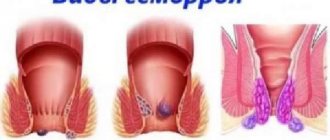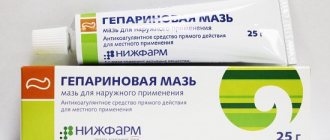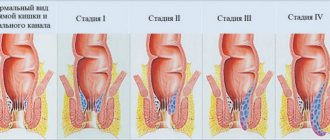The question of how to treat hemorrhoids at an advanced stage does not lose its relevance. To solve such a delicate problem, drugs are used in the form of tablets, capsules, rectal suppositories, gel ointments and microenemas. If the disease rapidly progresses and is accompanied by the formation of large venous nodes, then the person may be recommended minimally invasive or radical methods of treating this pathology.
Stages of chronic hemorrhoids:
Stage 1 - discharge of scarlet blood from the anus without prolapse of hemorrhoids Stage 2 - prolapse of hemorrhoids with the preserved ability of their independent reduction Stage 3 - periodic prolapse of hemorrhoids with the possibility of manual reduction Stage 4 - constant prolapse of hemorrhoids along with the rectal mucosa intestines and the impossibility of their manual reduction.
Prevention of hemorrhoids
Prevention of the disease is aimed at eliminating the factors contributing to its development. If you follow these rules, you will not need to worry about whether hemorrhoids can be cured. Such measures include:
- Diet. Exclusion of hot, spicy, fatty foods, fast food.
- Hygiene skills. Thorough toilet of the anus area.
- Physical activity. Elimination of a sedentary lifestyle. Performing exercises that normalize blood circulation in the pelvic area and intestinal motility.
If preventive measures are taken, the occurrence of pathology can be prevented.
However, if hemorrhoids have already formed, they can be easily cured, without pain or surgery, by resorting to one of the above procedures. Make an appointment
Treatment of hemorrhoids without surgery:
Treatment of hemorrhoids without surgery is most effective in the early (1-2) stages of hemorrhoids, in the acute period of the disease and in the presence of contraindications to surgical treatment.
Conservative (without surgery) treatment of hemorrhoids involves prescribing specific drug treatment regimens with drugs that help relieve inflammation and normalize blood flow in thrombosed hemorrhoidal veins. According to indications, our doctor will additionally prescribe physiotherapeutic methods for treating hemorrhoids in combination with local effects (ointments and suppositories). Great importance must be paid to following a diet to normalize stool, which will be discussed in detail in more detail about the operation .
Drug treatment
The maximum effectiveness of therapy for hemorrhoids and medications is observed if drugs for external use and oral administration are used in combination.
The following names of medications are prescribed for oral administration:
- Detralex. The active components of the drug are hesperidin and diosmin, which effectively strengthen the walls of blood vessels and enhance the tone of cavernous veins. When using the drug Detralex at an early stage of the development of hemorrhoids, it is possible not only to completely get rid of the characteristic symptoms of the disease, but also to completely cure it.
- Aescusan. The pharmacological effect of this product is due to the inclusion of thiamine (vitamin B1) and natural horse chestnut extract in its composition. The drug is a herbal venotonic that has angioprotective, anti-inflammatory, antioxidant and decongestant effects.
- Troxevasin. This drug belongs to the category of classical venotonic agents with angioprotective properties. The active component of Troxevasin is the substance Troxerutin, which reduces the permeability of the walls of blood vessels, thereby eliminating signs of the inflammatory process.
- Phlebodia-600. The therapeutic effect of the drug Phlebodia-600 is due to the content of diosmin, which has angioprotective, anti-edematous and anti-inflammatory properties. The ability of the drug Phlebodia-600 to improve microcirculation in the blood vessels of the anorectal area has been clinically proven.
Parkes hemorrhoidectomy:
Parkes hemorrhoidectomy is less traumatic for the patient, although more labor-intensive for the surgeon performing the operation. The operation involves removing the hemorrhoidal tissue while preserving the mucous membrane. Surgical treatment of hemorrhoids according to Parks, also performed under general anesthesia, requires hospitalization for at least one day, but is tolerated more easily by patients than the Milligan-Morgan operation. The postoperative period and the patient’s rehabilitation period with this type of operation are significantly reduced.
Prices
Price (rub.)In installments* (rub.)Consultation with a surgeon on surgery (SPECIAL)0—Online doctor’s opinion on surgery (SPECIAL)0—Non-surgical removal of hemorrhoids, category I. complexity from 3550—Non-surgical removal of hemorrhoids, category II. complexityfrom 5250—* You can read more about the conditions here - Treatment on credit or in installments
The cost is preliminary. The exact cost of the operation can only be determined by a surgeon during a free consultation.
Advantages of minimally invasive methods for treating hemorrhoids:
When comparing minimally invasive methods for treating hemorrhoids (laser vaporization and disarterization according to HAL-RAR), one can note their significant advantages over traditional surgical methods of hemorrhoidectomy:
- high treatment efficiency (up to 98%)
- minimal damage to underlying tissues
- The operation lasts only about half an hour
- practically absent or mild pain syndrome
- quick rehabilitation period
Our clinic is equipped with modern equipment for accurate, quick diagnosis and effective treatment of hemorrhoids. All equipment is reliably imported.
proctologists with extensive experience will work with you Do you want to live a full life without pain? Come to our clinic!
Hemorrhoids or hemorrhoids
Hemorrhoidal cones or hemorrhoids - this is what patients sometimes call the manifestations of hemorrhoidal disease, namely, varicose changes in cavernous formations around the anus.
But, we agree, hemorrhoids sound simpler and, unfortunately, more understandable for a very large number of people suffering from hemorrhoids.
Such manifestations - bumps at the anus - do not occur unexpectedly. As a rule, they are preceded by long-term, but not pronounced symptoms, to which patients do not pay due attention.
This may be a nagging pain when straining or before going to the toilet. It may even be the release of some blood in the stool...
But there is a category of patients who know how to endure. Symptoms are not a constant concern. They showed up and left for a while. In the meantime, as you think, the disease has receded, it continues its work inside the rectum. And when (of course, figuratively speaking) there is not enough space inside, the disease comes out, manifesting itself in what are called hemorrhoids.
These “bumps” feel like pouches of skin filled with blood. Yes, by and large, it is. After all, hemorrhoids themselves are nothing more than varicose veins of the rectum. And if we don’t see the internal nodes, then the expanded external ones cause concern.
What to do if you find yourself with “hemorrhoids”?
Firstly, you need to realize that since the problem “came out”, then this is definitely not the initial stage of the disease and consult a doctor.
Our proctologists also come to such long-suffering patients who manage to straighten the nodes for several weeks and live with them. They usually come when the node is pinched, a blood clot forms and the pain becomes incredible.
It shouldn’t come to this!
If we saw nodes, we went to the doctor. Hence the next question.
Which doctor should you go to if you have prolapsed hemorrhoids or when “hemorrhoids come out.”
These issues are dealt with by a proctologist, also known as a coloproctologist (these are the same specialist).
In government agencies, for example, in clinics, a proctologist is a rarity, so with such a problem everyone is sent to a surgeon.
Also, the government agency recommends inpatient treatment through surgery in such cases. And it’s completely in vain, because hemorrhoids up to stage 4 can be cured using minimally invasive methods, without surgery or hospitalization.
So, at the first appointment, the proctologist will assess the problem and make a diagnosis indicating the stage of development of the disease. As we have already said, up to stage 4 can be cured without surgery - and this is not quackery, but decades-tested techniques that came to us from Europe back in the late nineties - early two thousand.
As for the examination itself, to identify hemorrhoids it is necessary that it consist of at least three factors, in addition to consultation:
- digital examination
- anoscopy
- rectoscopy
How is a proctologist examined?
The patient lies on his left side, bends his legs at the knees, and assumes a “fetal position.”
The doctor, after applying anesthetic ointment, conducts an examination - digitally and instrumentally.
Using an anoscope, he examines the rectum to a depth of 10 cm - this is the height at which hemorrhoids appear. He also examines the rectum with a proctoscope to a depth of up to 25 cm - don’t be alarmed, this is not scary, but it is absolutely necessary to exclude other serious proctological diseases, for example, colorectal cancer.
After the examination, the diagnosis will be clear to the doctor and he will be able to select the most effective treatment options.
So how to treat hemorrhoids without surgery?
There are several options. The first and simplest and cheapest method of treating hemorrhoids is conservative. This is the use of a complex of tablets, suppositories, ointments and physiotherapy. However, it is suitable only for the very initial stages of hemorrhoids and allows you to forget about the problem for a long time. That’s why we always say – go to the doctor as soon as you notice a problem! Easier, faster treatment.
As you remember, if the nodes come out, then everything inside is no longer rosy. Therefore, up to stage 4 (hemorrhoids have only four of them), that is, up to the penultimate stage, more serious treatment methods are used
One of the most effective of them is ligation. We are proud of our specialists and equipment, which allows us to fearlessly include a guarantee for this treatment in the contract!
How is ligation performed?
The hemorrhoidal node is pulled into the ligator by a special pump, then a latex ring is applied to its stem, which compresses the blood supply to the node. The node does not receive nutrition, dries out and is eliminated from the body naturally.
The second treatment option is sclerotherapy of hemorrhoids.
A special drug is injected into the node, which causes the vessel feeding the node to stick together and also cuts off its nutrition; the node also dries out and is removed naturally.
Prices for services.
Initial appointment with a proctologist, proctologist-surgeon:
| 900 rub. |
Examination of proctologist, Candidate of Medical Sciences Dementieva E.A.
| 1500 rub. |
| Ligation of hemorrhoids (1 ring) | 8,000 rub. |
| Sclerotherapy of hemorrhoids (1 procedure) | 11,000 rub. |
Work on mistakes
Judging by the advertising, we are offered to treat hemorrhoids only locally - with suppositories (suppositories), ointments, gels. It is not right. In order to stop an exacerbation, it is also necessary to normalize the stool so that it becomes regular and does not injure the area of exacerbation. For this, preparations with dietary fiber (Mukofalk, Fitomucil, Psyllium, etc.) or laxatives with lactulose (Duphalac, Normaze, Goodluck, etc.) are usually used. You can add digestive enzyme supplements and probiotics. They speed up recovery and prevent the occurrence of new exacerbations of phlebotonics. They compact the wall not only of veins, but also of the cavernous bodies. There are many such drugs; drugs with bioflavonoids (Detralex, Diosmin, Vasoket, Phlebodia, etc.) are usually used.
It is important to understand about local preparations that, regardless of the dosage form, they can contain 4 types of active substances in different combinations: painkillers, anti-inflammatory, prevent the formation of blood clots and hemostatic (see infographic). All of them are aimed at treating the corresponding symptoms. And the drug must be chosen so that it helps specifically with your symptoms. So, if there is bleeding, do not use products with heparin, they prevent blood clotting. In such cases, vasoconstrictors and hemostatic agents are needed.










